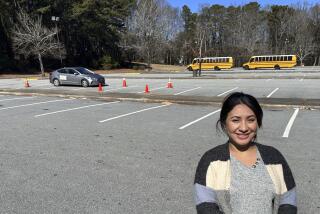Womenâs School in Appalachia Lights a Beacon of Hope : One womanâs plight helped launch the New Opportunity School in Kentucky. It builds self-esteem and self-reliance.
BEREA, Ky. â It started eight years ago with a personal crisis: a newly divorced woman desperately needed a fresh start. She had no money. She had no marketable skill. She had no confidence. And she had very little hope.
What she did have was a friend in Gurney Norman, a writer and English professor at the University of Kentucky.
In the spring of 1986, Norman related the womanâs plight to Jane Stephenson at Berea College. Stephenson, the wife of Bereaâs president and an expert on adult education, went to work. Her efforts marked the beginning of the New Opportunity School for Women, which since has helped dozens of low-income women from southern Appalachia seize control of their lives.
Take the case of Cheryl Estep, who just completed the schoolâs intensive three-week course in self-reliance and personal esteem: She is 35 and a grandmother. At 14 she dropped out of the eighth grade in Carter County, Ky., got married and had a baby.
When she began working for a high school equivalency certificate in 1992, she hid her books so that her disapproving husband would not know she was studying and hoping to find a job.
But two days after enrolling at the New Opportunity School in January, Estep--feeling lonely, out of place and frightened--packed her belongings and got ready to go home. A telephone call from a friend convinced her to stay. By the end of the session, she says, she was a changed woman.
Last week, she was at the Carter County Adult Education Center studying again. âMy husband is having a hard time right now accepting the change in me,â she said. âBut I canât go back to the way I was. I never will. Iâm going on to school, and nobody is going to stop me.â
Since the New Opportunity School opened its doors with a grant from the Educational Foundation of America, 152 women--nearly three-fourths of them from families with an income of less than $10,000 a year--have completed the course. At last count, more than 70% of them had gone on to find jobs or enroll in college.
Estepâs story is typical. One woman who earned $2 an hour folding clothes in a laundry before she went to the school is now a respiratory therapist in a hospital. She no longer receives food stamps, and she has moved out of public housing.
Alma Young of Grayson, Ky., who was âdigging ditches and painting fencesâ two years ago, is studying biology at Ashland Community College.
Joann Hall, who went to the New Opportunity School after being widowed in her mid-50s, operates a state center preparing students for high school equivalency examinations.
Robin Azee was unemployed and living with her parents when she entered the New Opportunity School at the age of 29. She went home and spent a year and a half studying for college admission; now she is a sophomore at Berea and a member of the Student Senate. She entered her third semester with a 3.3 grade point average.
âI went home from the New Opportunity School a very, very different person,â Azee said. âI felt like I could conquer the world.â More than anything else, the course is designed to resuscitate this kind of confidence and self-worth.
The school day begins at 6:30 a.m. and ends after midnight. There are group and individual sessions with a counselor, lectures on the careers of exemplary mountain women, writing exercises, a daily class in Appalachian literature and an introduction to computers.
During the afternoons, the students report to offices and businesses in the community to work as interns. On weekends, there are visits to museums in Cincinnati and Louisville.
Perhaps more important, the women spend hours talking among themselves--time, they say, when they come to share their innermost feelings.
It is not unusual, Stephenson says, for women to come to the New Opportunity School in the face of discouragement. While children are usually supportive, mothers and husbands often object. And some marriages are too frail to survive the wifeâs transformation.
Stephenson, who runs two sessions a year, has explored the possibility of exporting her program to urban settings across the country. And word of the programâs success has brought inquiries from activists interested in emulating the Appalachian program for poor women of the Israeli-occupied West Bank and Gaza Strip.
More to Read
Sign up for Essential California
The most important California stories and recommendations in your inbox every morning.
You may occasionally receive promotional content from the Los Angeles Times.










